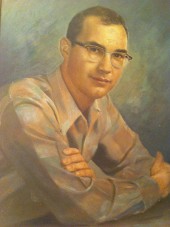April 10, 2014.
Morning thoughts inspired by Stephanie Donald…
There were, thankfully, many even early workers in our cause that I did not know or know well. Those more interested in the spiritual side I did not know because I was not interested in that — not that I opposed it.
Some of them worked with Harry Hay, and it is worth pointing out that they knew and worked closely with Harry, and John Burnside, and “saw” him in a way I did not.
We worked with Harry and visited with him and saw another side — such as going to Renaissance Fairs and living in San Juan Pueblo. Yet the side of Harry they saw did not conflict with the side I saw, as they shared the spiritual interest with him I was not interested in.
That may explain why a few people I did not like, or appreciate: They were interested in an aspect I was not.
I knew I did not have time to get involved in all aspects. Some did, such as Jim Kepner, though mostly he wanted to know what others were doing, knowing it was history. But he tried to write/support ONE, The Advocate, etc.
Others thought getting into politics would be a good way to educate on our issues. Some kept pushing in their church. And some, including our own Jim Schneider, pushed law issues — he got attorneys to defend school teachers, etc.
(That interest in pushing to use the courts to get “justice” he shared with Don Slater. They both did it on issues other than sexuality. Jim Schneider fought over the government’s taking his land (eminent domain to put in a parking lot for the school).
Jim Kepner made it into a book, The House that Found a Home; the house was moved to Commerce where it remains.
Don Slater fought the city over trying to dictate use of houses in his district—historic, Carroll Street/Echo Park. And cutting back his shrubbery — they caved in when he pointed out they were not trying to make others cut their’s back. (The house is on a corner lot and could make it hard for drivers to see — at least that was the argument.) At the house in CO, he fought an increase in property taxes — and won, and fought the attempt to make him pay for part of an irrigation ditch expansion when the man doing the work had ignored him — since he was “an absentee owner.”
He won.
It was such stubbornness that made Don Slater such a good activist. But which made a few fellow activists not like him and misunderstand him. And his sense of humor was misunderstood — he would play devil’s advocate or argue something he did not believe in order to “educate” the issue — summed up in what I have learned to be important in any effort: Watch out for unintended consequences.


